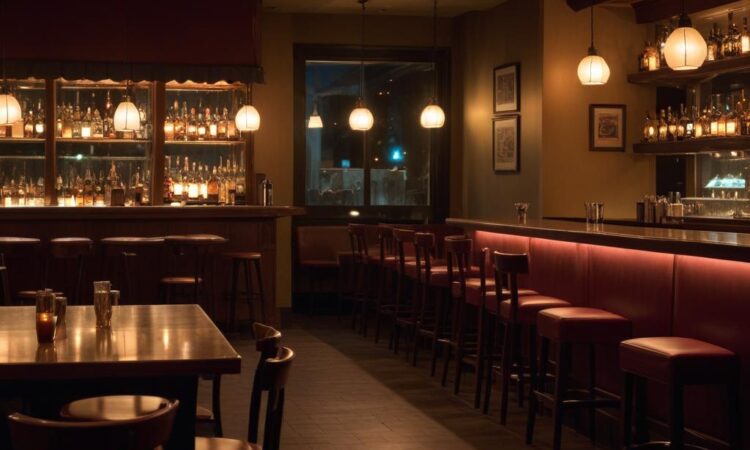Fears Empty Restaurant TikTok Trend Could Last
There are fears that tax and wage rises mean restaurants and bars will be quieter than usual all year. The impact of increased living costs on consumer spending is expected to be significant, potentially leading to a prolonged period of reduced footfall for hospitality businesses. This follows a concerning trend on TikTok, where videos depicting empty restaurants have garnered significant attention and fueled anxieties within the industry.
The rising cost of living is squeezing household budgets, forcing many to reconsider their discretionary spending. Eating out, often considered a luxury, is one of the first areas where people cut back. This trend is particularly worrying for smaller, independent restaurants and bars that have less financial resilience to weather a downturn. Larger chains, with their greater resources and economies of scale, may be better positioned to withstand the pressure, but even they are likely to experience a noticeable impact.
The TikTok trend, while perhaps not entirely representative of the national picture, serves as a powerful visual metaphor for the concerns within the industry. Videos showing sparsely populated dining rooms and bars amplify the anxieties of business owners already struggling with soaring energy prices, supply chain disruptions, and staff shortages. The perceived negativity amplified by social media could create a self-fulfilling prophecy, further discouraging people from dining out.
Economists are predicting a challenging year for the hospitality sector. Analysis suggests that disposable income will be significantly reduced, impacting consumer confidence and spending habits. The combination of rising inflation, increased interest rates, and reduced real wages is creating a perfect storm for businesses reliant on discretionary spending.
The government has acknowledged the challenges facing the hospitality industry but has yet to announce significant measures to alleviate the pressure. While some support packages have been implemented, many feel they are insufficient to address the scale of the problem. The industry is calling for targeted support to help businesses navigate the current economic climate and avoid widespread closures.
The long-term consequences of a sustained downturn in the hospitality sector are significant. Job losses are a major concern, as are the potential ripple effects on related industries, such as food suppliers and beverage producers. The closure of restaurants and bars could also have a detrimental impact on local economies and communities.
Many businesses are exploring strategies to mitigate the impact of reduced consumer spending. These include implementing cost-cutting measures, revising menus to offer more affordable options, and increasing marketing efforts to attract customers. Some are also experimenting with new business models, such as offering takeaway and delivery services to broaden their reach.
However, the success of these strategies is uncertain given the severity of the economic challenges. The ability of the hospitality industry to adapt and survive will depend on a number of factors, including the duration of the economic downturn, the level of government support, and the ingenuity and resilience of individual businesses.
The situation highlights the vulnerability of the hospitality industry to macroeconomic factors. Its dependence on discretionary spending makes it particularly susceptible to economic shocks. The current climate underscores the need for greater resilience and adaptability within the industry, as well as the importance of government support during times of economic uncertainty.
The ongoing impact of the pandemic continues to play a role, with lingering anxieties about public health and the ongoing effects of supply chain disruptions adding to the challenges. The combination of these factors creates a complex and unpredictable environment for businesses trying to navigate a difficult economic landscape.
Experts suggest that the situation requires a multi-faceted approach. Government intervention, coupled with proactive strategies by businesses and a supportive consumer response, will be crucial to navigating this period of uncertainty. The coming months will be critical in determining the long-term health and viability of the hospitality sector.
While the TikTok trend might seem trivial, it serves as a stark reminder of the real-world anxieties faced by the hospitality industry. The empty restaurants depicted in these videos symbolize the broader economic pressures affecting businesses and consumers alike. The coming year will be a test of resilience for the sector, requiring innovative solutions and a collective effort to overcome the challenges.
The future remains uncertain, but one thing is clear: the hospitality sector is facing a significant challenge. The extent of the impact and the ability of businesses to adapt will shape the landscape of the industry for years to come. The situation demands close monitoring and proactive measures to mitigate the potential long-term consequences.
Further analysis is needed to fully understand the extent of the problem and the effectiveness of various mitigation strategies. Data on consumer spending, business revenues, and employment within the sector will be crucial in informing policy decisions and supporting businesses in need.
In conclusion, the fears surrounding the potential for a prolonged period of empty restaurants are not unfounded. The confluence of economic factors, amplified by social media trends, presents a significant challenge to the hospitality industry. Addressing this requires a collaborative effort between government, businesses, and consumers to navigate this challenging period and ensure the long-term viability of the sector.
The situation underlines the importance of supporting local businesses and appreciating the crucial role they play in our communities. By understanding the challenges they face and making conscious choices as consumers, we can collectively help to ensure the survival and prosperity of the hospitality industry.

